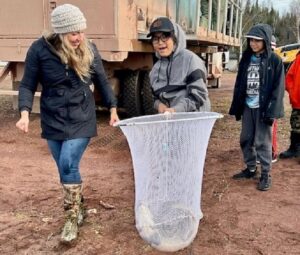Algonquin Avenue Public School students engage in on-the-land learning

By Rick Garrick
PASS LAKE — A group of Algonquin Avenue Public School students recently learned some of the Anishinaabemowin words for different fish (gigoonh) species during a Nov. 16 visit to the Dorion Fish Hatchery.
“We tried to incorporate [Anishinaabemowin] when they were out there,” says Corine Bannon, Native Language teacher at Algonquin Avenue Public School and Fort William citizen. “We had two classes, so that would be 30 students from Algonquin, and most of them are in Native Language.”
Bannon says the students, which were from Grades 4-6, had an opportunity to release trout into Pass Lake, which is located along the highway to Sleeping Giant Provincial Park.
“The students had the opportunity to carry them from the nets and then put them into Pass Lake,” Bannon says. “It was a first time for most of the students to do that, so it was quite exciting.”
Bannon says they earlier toured the Dorion Fish Hatchery where the students were shown the different stages, from eggs to large adult fish.
“I call it on-the-land learning and they were excited to see [the fish],” Bannon says. “Our guide would go through the different stages of how the fish progressed. It was so engaging, they were really good at explaining the fish stages.”
Bannon says they used the Anishinaabemowin words for the fish during the tour, including waakwag for fish eggs; name (pronounced as namay) for sturgeon; odazhegomoo for bass; ogaa for walleye; and ginoozhe for northern pike.
“So I would ask my students what is fish eggs in Anishinaabemowin and they would tell me, they would say waakwag and I was so excited that they were able to use the language while we were there,” Bannon says.
Bannon says she usually talks to the students about the importance of smudging, nookwezigan in Anishinaabemowin, and how they use the four traditional medicines on Mondays.
“Every Monday, we smudge at Algonquin,” Bannon says. “During the week, we do common phrases, we do games in Anishinaabemowin. For Christmas, we’re going to use a lot of Christmas themes in the language.”
Bannon says she also teaches the students how to introduce themselves in Anishinaabemowin.
“I teach it from Grade 4 to 8, so Grade 4, we’re just learning the basic Anishinaabemowin,” Bannon says. “In the higher grades, like the Grades 7 and 8, it’s usually putting sentences together, the complex language.”
Bannon says the Anishinaabemowin classes are very popular at Algonquin Avenue Public School.
“I have most of the students in Anishinaabemowin,” Bannon says, noting that French language classes are also an option. “So there’s been a real turnaround for students who are taking the language, and now mostly in Anishinaabemowin. I have students who are non-Indigenous who want to be in this program.”
Bannon says they have also been having school announcements in Anishinaabemowin at Algonquin Avenue Public School.
“For the last two years, I’ve had students say the announcements in the language,” Bannon says. “I find that it’s empowering; it empowers our students to hear the language, to learn the language, and that pride is there — they’re all wanting to do the announcements in the language.”
Bannon says the school also has big drum, dewe’igan, teachings by Orville Councillor for Grades 7 and 8 on Wednesdays.
“It is so amazing to have 15 to 20 of our young boys, gwiiwizensag, around the big drum,” Bannon says. “I’m always so humbled by how much those gwiiwizensag really want to learn the songs and the teachings. We actually have our boys participating using the drum in our assemblies.”
Bannon says they usually talk with the girls, ikwewag, about the hand drums and the hand drum protocols while Councillor is talking about the dewe’igan.
“So it’s really rich in Anishinaabemowin, traditions, and cultural teachings in the language,” Bannon says.


